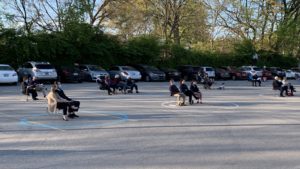
Members of The Temple sat in outlined, socially distant circles on the back parking lot during an outdoor Shabbat service, Friday, April 16. The service was one of many steps Louisville synagogues are taking to reopen following a year of virtual operations due to the COVID pandemic. (photo provided by The Temple)
By Lee Chottiner
Community Editor
With COVID vaccination rates hitting record numbers nationwide and all people age 16 and up now eligible for the shots, Louisville’s synagogues are moving forward fast with plans to reopen.
The Temple and Keneseth Israel have announced detailed plans for gradual reopenings. Other synagogues are in various stages of the process. Anshei Sfard and Chabad were already holding in-person services.
Here is an overview of the reopenings. Contact your synagogue for all the details:
The Temple’s reopening will take place in several ways:
• In-person indoor Shabbat services resumed Friday, April 23. Eighteen vaccinated congregants may attend on Friday nights or Saturday mornings with RSVP on The Temple website or a call to The Temple office. Worshippers must “check a box” attesting that they have been fully vaccinated.
• Occasional outdoor services for up to 50 vaccinated or unvaccinated worshippers, will be held. The first one happened on April 16.
• In-person b’nai mitzvah services and lifecycle events are already being conducted in the building.
• In-person b’nai mitzvah classes will start in May.
• The number of people allowed at graveside funeral services is increasing from 20 to 40.
• Efforts to encourage Temple and ECEC preschool employees to get vaccinated will continue.
Centers for Disease Control guidelines – including facemasks and social distancing – for indoor and outdoor services, will be enforced, though temperatures will not be taken. There will be no onegs for now.
“The way we’re doing it is a very calculated manner so as to not do it too quickly in a reckless way,” said The Temple President Reed Weinberg. “I almost view this as we’re dipping our toe in the water.”
Weinberg said the reopening is designed to be “slow” and “flexible” and subject to monthly review by the task force. “We can either expand or contract this, depending on the state of the virus, how it is in Louisville and Kentucky,” he said.
For months, The Temple has been holding lifecycle events and social action projects in the building under CDC guidelines.
“We never really, quote, closed,” Weinberg said.
Anshei Sfard resumed in-person services last year on Shavuot; classes were added a short time later around Rosh Hashanah.
Rabbi Simcha Snaid said anyone may attend as long as they are not sick or exhibiting symptoms.
“You do not have to be vaccinated to come to services,” he said. “We are still wearing masks throughout the services and davening in a larger space to allow more room between people.”
Chabad of Kentucky holds services with a 50 percent maximum capacity.
Rabbi Avrohom Litvin said the synagogue has been reconfigured to provide each participant an individual booth for prayer.
In-person 30-minute services twice a week were introduced in February to allow people to say Kaddish. In March, abbreviated Saturday morning services were added, followed by Friday night Kabbalat Shabbat services in April. All services require reservations and follow CDC guidelines.
For Shavuot, a hybrid program of one-hour classes on Zoom followed by two hours of service and classes in person will be used. In-person classes are slated to resume in July, depending on vaccination and infection rates here.
Keneseth Israel will reopen its building on May 1 for services and classes. KI has already held outdoor services and classes:
• All services and classes will be held in the main sanctuary.
• Only use the fire exit to the sanctuary; all other areas of the building will be off limits.
• RSVPs are required for all services and classes; the number of participants will be limited.
• KI will return to its normal service times.
• Worshippers must share a copy or emailed image of their vaccination cards.
• No food will be served after services.
Adath Jeshurun has established a reopening subcommittee that includes an attorney, physicians and the vice president of the board.
According to AJ President William Esakov, the subcommittee will determine when to reopen, whether all services should be open at once or in stages and what policies and procedures should be in place.
Esakov expects a draft plan to be shared with clergy and board leaders within the next two weeks with board approval in time for the annual meeting in May.
Temple Shalom, which held an outdoor hybrid service for Simchat Torah, had set May 15 as its targeted reopening date, but Ritual & Music Committee Chair Keiron O’Connell, said more issues need to be worked out first.
“We’re putting that date back while we’re working out the details,” O’Connell said. “It’s still our goal to reopen, but we don’t have a firm date.
All the synagogues say they regularly assess the situation tightening or loosening restrictions as conditions warrant.
As in-person gatherings resume, synagogue leaders say services and programs will continue to be live-streamed in some form, effectively changing the way Jews access synagogue life.
Last year, the Jewish Federation of Louisville, using seed money from the Jewish Heritage Fund for Excellence, made grants to the synagogues for installation of cameras in synagogues to live-stream High Holy Day services – a resource the synagogues plan to continue utilizing.
Synagogue leaders say the virtual component is necessary for worshippers who live out of state or can’t get to the synagogue on a regular basis, especially shut-ins, travelers and young families with children.
“I think that’s part of our reopening,” Weinberg said. “We continue to offer those services; they’re not going away.”



